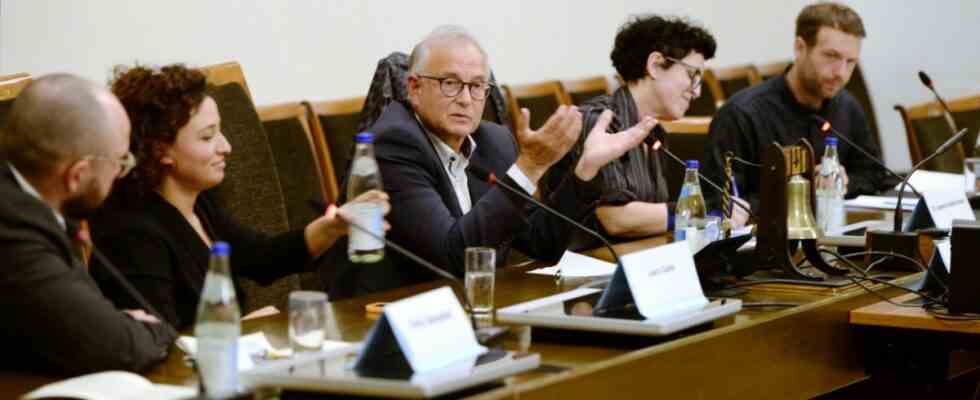The prospects that psychologist Louis Levitan opened up on Tuesday evening are not pretty. “I see totalitarian tendencies emerging here,” said the Franco-German, who grew up in Munich and is the son of Jewish parents. Throughout his life, the 67-year-old was affected by anti-Semitism, i.e. the general form of anti-Semitism. Now he’s observing a “new phase”: “Anti-Semitism doesn’t stop, it’s actually spreading. And anti-Semitic tendencies are always anti-democratic.”
As a contemporary witness, Louis Lewitan spoke at a panel discussion in the almost full main meeting room of the town hall on the subject of “50 years of the Olympic assassination – anti-Semitic alliances and continuities”. The debate was organized by the city’s Department for Democracy in cooperation with three other local institutions: the Research and Information Center on Antisemitism (RIAS), the Association of Jewish Students and the Young Forum of the German-Israeli Society.
The 1972 Olympic assassination in Munich was merely the starting point to draw a link to the present and to show how the phenomenon of anti-Semitism persists, sometimes more, sometimes less subliminal. Even then it was clear to see that anti-Semitism thrives in completely opposite milieus, as the anti-Semitism researcher Jakob Baier, doctoral student at Bielefeld University, explained in his introductory lecture: “The Munich Olympic attack was logistically supported by German neo-Nazis and celebrated by German left-wing extremists.” Of course, hatred of Jews had developed long before that as a commonality between different political camps. Politicians and journalists in the German Empire had already agitated against the idea of a Jewish state. And at the beginning of the 20th century there were also corresponding currents in socialist movements.
“Anti-Semitism comes from all sorts of political directions,” said Annette Seidel-Arpaci, the head of the Rias in Bavaria. Laura Cazès, who works full-time at the Central Welfare Office for Jews in Germany, put it this way: “There is not a single anti-Semitism-free area in German society.” Politics, culture, science – there are signs of a revived anti-Semitism everywhere. It is something like an “ideological cement”. Born in Munich, she recently published a book with essays on the emotional state of Jews. “Sure we didn’t stay” is the title of the work and it deals with the latent threat that Jews still see themselves exposed to in this country even after the Holocaust, often only with soft remarks, occasionally also with deeds.
The middle of German society has not worked through their anti-Semitism
Of course, anti-Semitism is only noticed in public when it manifests itself in the form of physical violence: “It’s only an issue again when it can no longer be negated,” says Cazès. Otherwise, (verbal) abuse is dismissed as an isolated case. The anti-Semitism expert Baier explains: “Anti-Jewish narratives that have been passed down for centuries have obviously seeped so deeply into the subconscious that many people no longer perceive them as anti-Semitic.” For Cazès, the phrase that politicians like to utter, “There is no place for anti-Semitism in Germany,” is at least a protective claim.
As far as the Jews’ sense of security in Germany is concerned, Louis Levitan can only agree with the author. “There was never any security,” he says in view of right-wing extremist parties such as the NPD and DVU or those going in the same direction national newspaper, who continued to spread anti-Jewish ideas in the post-war period. For Cazès, this is further evidence that “middle German society has not come to terms with its anti-Semitism.” The narrative of imported anti-Semitism by Muslims is also a “wonderful explanation so that you don’t have to question yourself”.
In this context, Jakob Baier spoke of a “defense against memories”. In addition to Holocaust denial, “post-Shoah anti-Semitism” is also characterized by a victim-perpetrator reversal, as Ankie Spitzer, widow of one of the Israelis murdered in 1972, experienced. Munich Police Vice President Georg Wolf once told her that the Israelis themselves were basically to blame for the massacre, since they had brought terror to Germany.
The psychologist Levitan also confirms the impression that German politicians and authorities are fighting back memories: “Germany is doing everything to be the victor in the supreme discipline of forgetting, repressing and denying.” Jakob Baier describes this using the example of the writer Günter Grass, who forgot his SS membership for a very long time: “After the attack in 1972, Grass wrote a letter to Chancellor Willy Brandt in which he was concerned above all about the image of the Germans abroad , but not about the fate of the victims and their families.” The agreement with the families of the victims in this Olympic anniversary year was only “guided by the fear of those responsible in politics of a renewed loss of reputation”.
Annette Seidel-Arpaci also locates the discussion about compensation payments to the bereaved in the continuity of anti-Semitic resentment. Then it was said again: “Aha, they want money.” Ankie Spitzer and the victims’ families were primarily concerned with coming to terms with the fate of their relatives. Quite obviously, the processing of history is necessary far beyond the Olympic assassination attempt of 1972.

